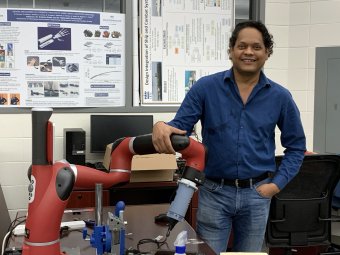Topic: HUMAN-ROBOT COLLABORATION FOR ADVANCED MANUFACTURING AND SURGICAL TASKS
Speaker: Dr. Krishnanand Kaipa, Assistant Professor and Director of the Collaborative Robotics and Adaptive Machines (CRAM)
Friday, October 9 at 3 p.m. online at https://vs.prod.odu.edu/kvs/interface_webex/?cid=202010_ECE7831VS_91606.
For more information, contact Dr. Chung Hao Chen at 757-683-3475 or email cxchen@odu.edu.
Biography:
Dr. Krishnanand Kaipa is an Assistant Professor and Director of the Collaborative Robotics and Adaptive Machines (CRAM) Laboratory in the Department of Mechanical and Aerospace Engineering at the Old Dominion University. Dr. Kaipa received his BE (Hons.) in Electrical Engineering from the Birla Institute of Technology and Science, Pilani, India and his Masters and PhD degrees from the Indian Institute of Science, Bangalore. He did his postdoctoral research at the University of Vermont and University of Maryland, where he was also a research assistant professor. Dr. Kaipa's research interests include biologically inspired robotics, collaborative robotics, embodied cognition, and swarm intelligence. Dr. Kaipa has published several journal articles, book chapters, and peer-reviewed conference papers in these fields. Dr. Kaipa, along with his PhD advisor, recently published a book on glowworm swarm optimization, a new swarm intelligence algorithm that was introduced as a part of his PhD thesis. He received best master thesis and best PhD thesis awards and best paper awards in international conferences and outstanding teaching award for a graduate course at the University of Maryland. Dr. Kaipa is a member of ASME and IEEE.
Abstract:
Humans and robots share complementary strengths in performing tasks. The versatility of humans allows them to adapt and handle non-repetitive tasks where operational parameters vary from one task instance to the next. Human manipulation skills are characterized by dexterity, compliance, and an ability to perform in tight spaces. Humans can also handle task contingencies and recover from errors. In contrast, robots excel at performing tasks requiring high speed, precision, and repeatability. They can also handle high payloads and operate for long durations without fatigue and compromising task quality. The field of human-robot collaboration attempts to leverage this feature of complementarity to design frameworks that allow humans and robots to interact in ways leading to enhanced task performance in diverse domains ranging from advanced manufacturing to medical surgery. The talk will introduce the underlying theme of this subfield of human-machine interaction, primary challenges faced (e.g., how to ensure safety when a human and robot share a workspace to collaborate on a physical task?), interaction modes (physical collaboration, remote interactions, social interactions), and recent advances in collaborative robotics toward meeting the requirements in the field. Representative case studies of human-robot interaction approaches will be presented in the context of non-repetitive manufacturing tasks (bin-picking, finishing, micro-drilling) and a surgical task (specimen retrieval with a hand-held robot). These advances are expected to make robots more useful for unstructured and non-repetitive tasks that are currently only performed by humans.




